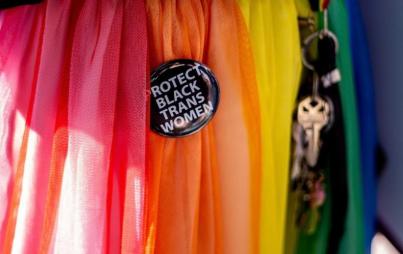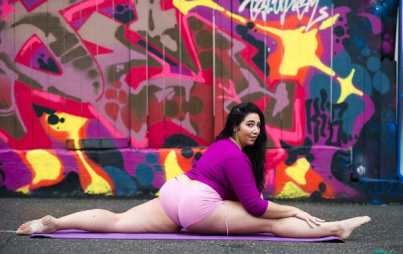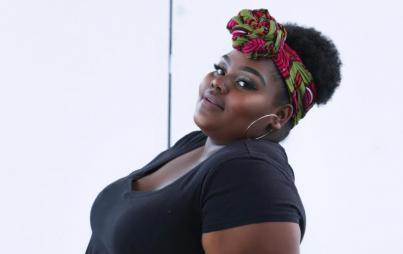
“Do I pass?”
I get this question every day. From strangers, lovers, and others.
Every trans woman holds a pair of broken pistols, one marked “Pride” and the other “Fear.” You never know which one will go off in your hand when you draw them.
Some days you twirl around your living room in a flowing floral skirt, espousing the emphatic, maniacal laughter of someone who finally showed them all. And others—you’re in front of a mirror or a computer monitor, inviting interrogation of your face, to document any offending angle of your jaw or amateur application of your makeup. Your queendom for a pointier wing in your eyes.
We want to live our truth, but that requires “living,” which may necessitate mimicry. Some women get their hair cut like Tina Fey to look attractive—others to avoid harassment when outside of their homes.
I reckon the right-wing gumshoes out there hyped on “exposing” trans women for our wicked deceptions have never felt the hands of a man whose cornered you in a gas station at midnight, combing your neck for stubble with calloused, greasy hands. And they should never have to. 
No one should ever be punished for not “looking like a woman right”—when a man physically assaults a trans woman, it is (in part) to make her pay for the inflexibility of his sexual identity, that desires but will not allow an escape from a gender binary.
Ask any trans woman who is not me and who dates men and you will find yourself inundated with a deluge of doubletalk in realtime, men who insult trans women to their face but check for a ring and a sign there’s “still a chance for him” behind her back.
A man has never asked me out, but he has followed me in his car for five blocks to call me a faggot—there is not time enough to explain to him that I actually like being called that in a consensual scenario and therefore the word has no real impact on me before he drives away, high-fiving himself all the way into that hellish normalcy.
I do not pass, as such. I tower, even for a “tall girl” (a little insider scoop on trans lady lingo for you). I am tall, muscular, and have a deeper voice than many cis men. I don’t like how I look in jeans, so I don’t wear them. I don’t shave or wear makeup everyday, but I keep the dress and stockings and combat boots, even when I hike along the trails of Santa Cruz. I am a terrific TERF nightmare in the flesh.
And off goes the good gun; I am beautiful.
I do not “pass” as a cis woman but I am still a woman, even when I don’t do it “right.”
But my work puts me in the (grateful) company of straight, cisgender women, who, for a number of reasons—including a lifetime of media educating them to judge other women by their appearances and limit personal contact to terse and superficial compliments on one another’s clothing—use fashion as a primary means of starting conversation with each other.
“I love your shoes!” Am I doing this right? “I hate your hair, it’s so good today?” Please acknowledge what I’m saying. “I am having the stocking envy at you right now.” I am trying to facilitate a friendly moment with you with the tools I have and they aren’t much and I wish it wasn’t this way.

The rest of us—trans women, fat women, women of color, disabled women—are told to camouflage ourselves if we want jobs or loving relationships and then eviscerated when our camouflage is not “convincing,” chided for not being content to just “be ourselves.”
I will never do woman right, so I’m getting it wrong on purpose.
I’m not covering up my garters anymore.
The gloves would come off if I ever wore gloves; you told me women like me didn’t belong in the nail salon so I learned to do them myself and they always look too nice to cover in scratchy wool bodybags.
You can jeer and sneer at the little black bands bracing my legs against the rolling tide of cisheteronormativity—but I’m not falling for it. If I hike my dress down to cover them up, you would dock me for wearing a dress in this weather, for “being too fancy” for a day job look, which is totally what some fetishist crossdresser would do, probably, if you had ever actually met one in real life.
I don’t mind looking like an apathetic crossdresser. A crossdresser is not a bad thing to be. It’s not who I am, but no amount of patiently explaining to you the nuances of identity and presentation will pry free your arm, slung over your face as if in mid-faint. 
This is Lilith myth on repeat: You want women to “dress like women” but you are scandalized at the sight of scaffolding. You impose on women to wear bras, but then chide them when their straps show underneath their tops, just as you raise a hackle at me when I don’t shave, when I don’t cover my pimples with makeup, when I over- or under-dress.
If I continue to try and mimic “how proper women dress”, I will shudder and shrink myself into utter fatigue. I can’t look like you—but I’ll always look like me. It seems such an obvious conclusion for an adult to make, but look at what I’ve had to work with: “proper, real, natural” men and women, scouring our Facebooks and livejournals to find the most unflattering, most “un-passing” pictures in our galleries, to mock us for not living up to the standards that have eroded their self worth so minutely. As if your haircut and suit and even the swaying of your shoulders while you walk weren’t decided for you by generations and generations of gender architecture.
Do I pass?
Do I care?
Not today.
Come back tomorrow to see which pistol signals the day’s races to proceed.






